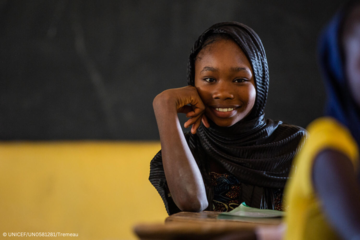International Women’s Day Focus: Digital Parenting Programmes and Addressing Gender Equality

This International Women’s Day, join us as we explore the theme “DigitALL: Innovation and technology for gender equality”, and how parenting programmes can work towards gender equality and ending gender-based violence (GBV).
Gender equality is not only a fundamental human right, but a necessary foundation for a peaceful, prosperous, and sustainable world. Despite progress in working towards gender equality over the last decade, the world is lagging behind on achieving SDG 5 (Sustainable Development Goal 5: Achieve gender equality and empower all women and girls) by 2030. According to the World Bank, 40% of countries worldwide limit women’s property rights, while out of all 195 countries, women face some form of job restriction in 86, and are not guaranteed equal pay in 95. Furthermore, GBV affects about 1 in 3 women over the course of their lifetime.
So how do we combat this? It will take a multidisciplinary approach, and organisations and governments around the globe have teams committed to this goal. While it is important to address the problem as it stands right now, an essential part of a sustainable solution is looking towards the future - and that’s where parenting comes in! While schools, peers, media and other factors affect attitudes towards gender, gender identity, and gender norms, parents continue to be the primary influence throughout childhood and adolescence. If we can ensure that children are raised in a way that promotes positive gender socialisation, changing discriminatory gender norms and promoting inclusive behaviours, we will, by default, address gender inequality and GBV, and remove limits on children’s potential.
Gender-responsive parenting refers to parenting that applies key principles, such as gender equality and inclusion, and promotes positive gender norms and socialisation to transform imbalanced power structures in families and future generations. Per UNICEF, parenting interventions can provide opportunities to promote gender-responsive parenting, positive gender socialisation messages and behaviour prior to adulthood and reduce exposure to gender-specific risk factors.
Parenting programmes can raise awareness among parents about the harmful effects of gender stereotypes on child development and the importance of promoting equity, respect, and individual strengths. Parents, especially fathers or male caregivers, can participate in positive and playful parenting activities, like sharing household duties, learning through play, and using positive discipline to understand the impact of harmful gender socialisation on children and model gender-equitable behaviours at home. These programmes can also focus on gender-related issues important for adolescents and help them make decisions by providing parent-child resources and dialogue around shared responsibility for the prevention of pregnancy, HIV and sexually transmitted infections, prevention of GBV, and promotion of positive sexual and reproductive health behaviours and menstrual health. In some cases, parenting programmes may need to address specific issues, including child marriage and harmful practices.
The Global Parenting Initiative (GPI) recognises the importance of parenting programmes in achieving SDG 5, especially the opportunity to reach parents on a far greater scale through our digital interventions.Thus, in addition to our initial positive and playful parenting content, we are testing the addition of modules focused on gender-responsive parenting and male caregiver engagement, and aimed at addressing intimate partner and GBV. Currently, we have several studies investigating these outcomes, including Parenting for Respectability Digital in Uganda, ParentText Optimisation and Evaluation in South Africa, the Ugandan Parenting for Respectability Implementation Science Cluster Trial, Co-Parenting to Reduce Conflict in the Family in Zimbabwe, Book-sharing for Fathers in South Africa, Malezi Bora na Maisha Mazuri: “Good Parenting for a Good Life” in Kenya, and a new study we are supporting, Gender-Responsive Parenting (you can read more about this exciting new study here).
Parenting programmes, especially digital parenting programmes, offer an opportunity to promote positive gender socialisation behaviours amongst parents and caregivers, fostering gender-responsive parenting and thus nurturing a more gender-equal world with less violence for the next generation. The GPI is proud to play a part in making this vision a reality.



